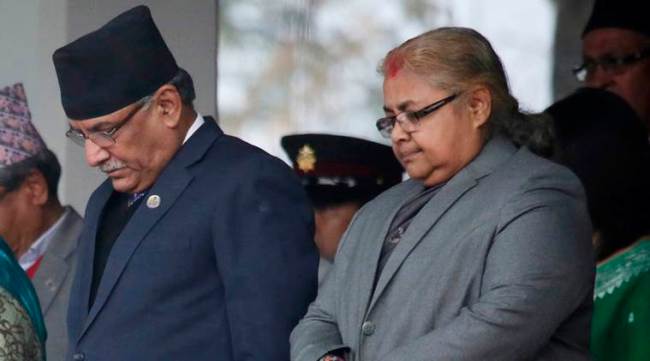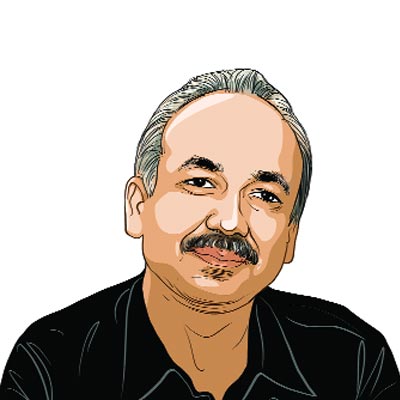Opinion The foreign hand
UN special rapporteur’s intervention in the impeachment issue is uncalled for
 FILE - In this Feb. 18, 2017, file photo, Chief Justice of the Supreme Court Sushila Karki, right, and Nepalese Prime Minister Pushpa Kamal Dahal observe a minute's silence during Democracy Day in Kathmandu, Nepal. Karki, Nepal's first female judge to head the Supreme Court, has been suspended after an impeachment motion was signed by parliament members on Monday, May 1, 2017. (AP Photo/Niranjan Shrestha, File)
FILE - In this Feb. 18, 2017, file photo, Chief Justice of the Supreme Court Sushila Karki, right, and Nepalese Prime Minister Pushpa Kamal Dahal observe a minute's silence during Democracy Day in Kathmandu, Nepal. Karki, Nepal's first female judge to head the Supreme Court, has been suspended after an impeachment motion was signed by parliament members on Monday, May 1, 2017. (AP Photo/Niranjan Shrestha, File)  FILE – In this Feb. 18, 2017, file photo, Chief Justice of the Supreme Court Sushila Karki, right, and Nepalese Prime Minister Pushpa Kamal Dahal in Kathmandu, Nepal. (AP Photo/Niranjan Shrestha, File)
FILE – In this Feb. 18, 2017, file photo, Chief Justice of the Supreme Court Sushila Karki, right, and Nepalese Prime Minister Pushpa Kamal Dahal in Kathmandu, Nepal. (AP Photo/Niranjan Shrestha, File)
The National Law Day — an annual event marking the birth of Nepal’s Supreme Court 64 years ago — on Tuesday was a subdued affair. The shadow of the conflict between the judiciary and the executive fell on the celebrations, with Prime Minister Pushpa Kamal Dahal and Speaker Onsari Gharti boycotting the function. President Bidhya Devi Bhandari’s presence was the only face-saver for the host, Chief Justice Sushila Karki, who is facing impeachment in parliament.
Karki, who was suspended from the post following the admission of the impeachment motion, had rejoined office after a single bench of the supreme court asked her through an interim order to “resume work”. However, Speaker Gharti asserted that process of “impeachment” was already a part of the process in parliament.
The issue, of course, has divided and polarised Nepal’s politics and civil society. It echoed even in far away Geneva. On May 5, UN Special Rapporteur on the Independence of Judges and Lawyers, Diego Garcia Sayan handed over a letter to Deepak Dhital, Nepal’s ambassador to the UN Office and other international organisations in Geneva, expressing serious concern over the impeachment process, which he claimed did not meet with international standards. The special rapporteur also asked the ambassador to share his letter, which calls for the withdrawal of the impeachment process, with the prime minister and the parliament. He warned that he would go public on the issue otherwise.
However, the letter did not take into account the facts and genesis of the conflict between the constitutional wings of the state — how the appointments of judges have been politically fixed, visibly affecting the perceived fairness, impartiality and independence of the judiciary. In fact, one of the judges of the supreme court, whose connections with international human right groups and the UN office in Geneva are known, had rushed to the Swiss city to lobby against the impeachment process. The special rapporteur’s letter is believed to be its outcome.
Unlike India and Sri Lanka, which have resisted attempts by the UN and international bodies to investigate human rights violations, Nepal has hosted them, especially since 2005-06 when it embarked on a journey of radical politics and began to build a peace process with the Maoists, who were fighting an insurgency. First, the Office of the Human Right Commissioner opened a special office in Nepal to assess the human rights situation under Ian Martin, who later moved to head the UN Mission that was assigned to monitor the peace process. Both offices folded up in unpleasant circumstances.
Various government agencies alleged that both offices were “biased” and anti-state. The UN bodies, nevertheless, continue to wield clout and champion issues closer to their heart. They align with internal players, political parties, and the constitutional wings of the state. The special rapporteur’s move to side with the chief justice and issue a veiled threat to parliament and the executive is just another example. It is also an example of the supreme court turning “activist” and collaborating with international agencies.
The ruling CPN (Maoist-Centre) and the Nepali Congress are together on the impeachment issue, while the main opposition, the CPN-UML has opposed it. The CPN-UML is also working to get the international bodies to support the CJ, not so much to retain the independence of judiciary, but to win a political battle. The CPN-UML, like the Nepali Congress and the Maoists, have been responsible for bringing the judiciary under the effective control of political parties.
The issue of impeachment has been put in abeyance till May 18, as the country holds local bodies election after a gap of 19 years on May 14. Political polarisation over the impeachment issue had revealed the potential of snowballing into a full-size conflict on the streets. The supreme court’s often whimsical and arbitrary approach to cases with political undertones has eroded its credibility; it is now considered more as an “extended domain” of the political parties. The UN rapporteur seems clueless about the ground reality.





